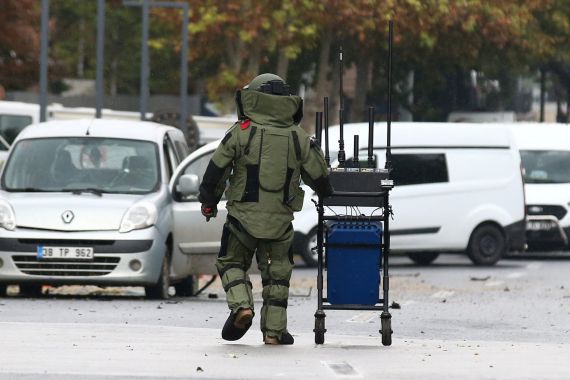In a sweeping crackdown following a recent suicide bomb attack in the heart of Turkey’s capital, Ankara, Turkish authorities have detained a staggering 928 individuals suspected of having ties to the outlawed Kurdistan Workers’ Party (PKK). The operation, which involved thousands of police officers and spanned across 64 provinces, marks a significant escalation in the government’s efforts to dismantle the “intelligence structure” of the PKK, which has been at the center of a decades-long armed rebellion in Turkey.
Unprecedented Nationwide Raids
The aftermath of the devastating bombing that shook Ankara on Sunday saw Turkish security forces launch a large-scale operation, with over 13,400 security personnel taking part in raids conducted across dozens of provinces. Interior Minister Ali Yerlikaya reported that the primary focus of these operations was to detain individuals believed to be affiliated with the PKK, emphasizing that this is just the initial phase of a broader investigation. The widespread nature of these arrests underscores the government’s intensified efforts to gather crucial information on PKK suspects.
Ankara Bombing Sparks Immediate Action
The bomb attack in Ankara occurred just hours before President Recep Tayyip Erdogan was scheduled to address parliament upon its return from the summer recess. A suicide bomber detonated an explosive device near the entrance to the Turkish Ministry of Interior, leading to chaos and a subsequent shootout with police. Fortunately, only two police officers sustained minor injuries during the incident. The attackers had commandeered a vehicle stolen from a veterinarian in the city of Kayseri, highlighting the audacity of the assailants.
PKK Claims Responsibility, Airstrikes in Northern Iraq
The PKK, a designated terrorist organization by both the United States and the European Union, swiftly claimed responsibility for the bombing in Ankara. A news website affiliated with the group conveyed their involvement in the attack. Turkish authorities also identified one of the assailants as a known PKK member. In response to the bombing, Turkey launched airstrikes on suspected PKK sites in northern Iraq, targeting the group’s leadership believed to be based in that region. These retaliatory strikes underscore the government’s resolve to combat the PKK insurgency.
The recent wave of detentions and the government’s determined efforts to root out PKK operatives have raised questions about the future of Turkey’s ongoing conflict with the Kurdish rebel group, which has resulted in tens of thousands of casualties since its inception in 1984. While these detentions are seen as a significant step toward dismantling the PKK’s intelligence network, it remains to be seen how this will impact the broader security landscape in the region.
















